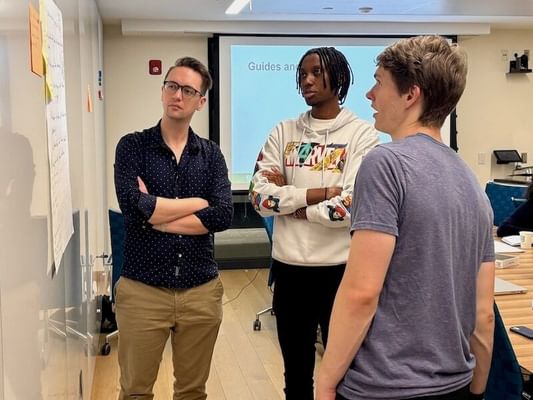- Undergraduate
Bachelor's Degrees
Bachelor of ArtsBachelor of EngineeringDual-Degree ProgramUndergraduate AdmissionsUndergraduate Experience
- Graduate
Graduate Experience
- Research
- Entrepreneurship
- Community
- About
-
Search
All Thayer News

Major Grant Funds Mentor Program to Boost Degrees in Engineering
Jun 10, 2025 | Dartmouth Advancement
The Sherman Fairchild Foundation recently awarded a $12.5 million grant to advance near-peer mentoring programs including Dartmouth Emerging Engineers (DEE) where seniors, juniors, and sophomores advise first-year students taking engineering courses.

A Dartmouth Emerging Engineers (DEE) tutor training session in which tutors discussed their rough visual sketch of how best to help students: How do you get them from "stuck with a problem" to "mastery of the concepts and skills"? (Photo by Catha Mayor)
For students suffering from imposter syndrome, intimidated by the idea of approaching a professor, or needing more individualized support, mentors can prove invaluable.
"Near-peer mentorship creates a uniquely powerful dynamic: mentees gain confidence and clarity from someone who has recently navigated the same path, while mentors deepen their own understanding and develop a lasting sense of purpose," says Professor of Engineering Petra Bonfert-Taylor, a cofounder of DEE. "Programs like DEE build community, foster belonging, and empower both mentors and mentees to thrive—not just academically, but as emerging leaders."
The foundation's grant will permanently endow 155 mentoring positions across three programs in Dartmouth NEXT—the campuswide initiative to increase the number of students graduating with a STEM degree. This expansion will cover 20–30 percent of all STEM courses and nearly 100 percent of the early-stage, or "gateway," courses. Success in these courses, which often have the largest enrollments, has been found to be particularly important for STEM retention.
In total, the grant will support 173 mentors in 107 courses, with combined enrollments of more than 4,000 students each year.
While there is an unmet national demand for more college graduates with STEM degrees, it’s not due to a lack of student interest. The challenge for colleges and universities is how to keep students who have expressed an interest in STEM majors in those academic programs. Some students arrive at college not fully prepared for the demands of collegiate-level STEM courses, and many students suffer from self-doubt. Nationally, more than half of first-year students who declared STEM majors at the start of college leave these fields before graduation.
At Dartmouth, nearly 53 percent of students in the classes of 2018 through 2022 entered with a primary interest in a STEM major, but fewer than 36 percent of them graduated with a STEM degree.
Personal and group mentorship provided by fellow students and recent graduates can make a significant difference for students pursuing a STEM major. According to data collected at Dartmouth as well as research conducted by organizations such as the International Journal for STEM Education, mentors provide invaluable help for students who may need individualized attention. Their work contributes to increased retention rates for STEM programs. Of the DEE participants who graduated in 2024, for example, 95 percent majored in a STEM field, and more than 80 percent of participants in the E.E. Just Program successfully completed a major or minor in a STEM discipline—achievements made possible in part by near-peer mentoring.
"The addition of peer mentoring to our excellent STEM ecosystem will position Dartmouth as a destination for any young person who wants to play a role in shaping the next century of science and technology," says President Sian Leah Beilock. "If students bring their drive and their good ideas, we will provide all the support they need to flourish and to lead."
Link to source:
For contacts and other media information visit our Media Resources page.
